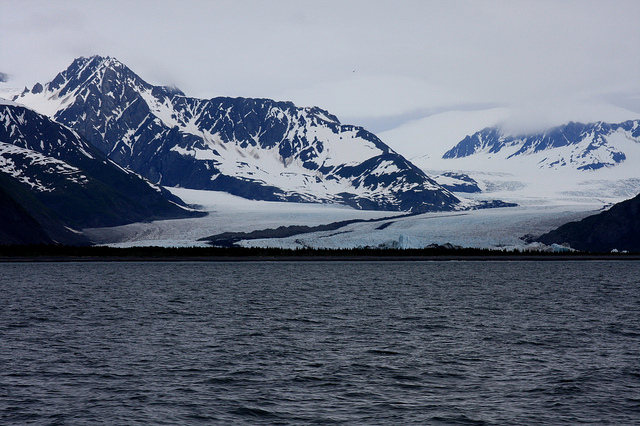Last week I sat with members of a tall-steeple church who expressed deep frustration that, despite encouragement, their pastor refused to preach on environmental issues. He was the sole regular preacher, so what he didn’t say in worship — in the largest gathering of the faithful every week — didn’t get said in that church. They speculated that he simply wished to avoid criticism.
Who would refuse to preach on hunger or homelessness, knowing that Jesus said, “I was hungry and you gave me food, I was thirsty and you gave me something to drink, I was a stranger and you welcomed me” (Matthew 25:35)? Yet climate change already causes drought, low crop yields, hunger, and thirst in many parts of the world. According to the UN High Commissioner for Refugees (UNHCR), 21.5 million people are already displaced annually by climate-related weather events1.
The 2016 Yale Climate Opinion Maps are quite instructive2. They show US citizens’ responses to 16 important climate questions in every state, county, and political precinct. Most people not only in the country at large but in every single county agree that climate change is happening and that they trust what scientists are saying about it. A large majority in every US county supports funding research into renewable energy (82 percent overall) and regulating CO2 as a pollutant (75 percent overall). And despite the current political move to dismantle the Clean Power Plan, at least two-thirds of citizens in every state and every congressional district support setting strict CO2 limits on existing coal-fired power plants.
But when asked whether they themselves discuss global warming at least occasionally, the generally orange map turns blue-grey: No state, no district, not even a single city finds a majority of people willing to talk about this.
In other words, most Americans think someone ought to do something about climate change but are unwilling to say so. No wonder political leaders are misreading the cues.
Who can possibly speak to this crisis? How about America’s moral leaders?
How about jumpstarting the conversation on creation care from the pulpit this summer? It may initially seem like plunging headfirst into a cold lake, but what a way to stay invigorated. Preachers who have taken this challenge say they are surprised at how many members welcome it — ready to join the conversation if invited.
Jesus’ parables, sayings, and stories from Matthew in July and August provide wonderful starting points:
- Matthew 10:40-42 (July 2) reinforces Jesus’ care for the young, blessing “whoever gives even a cup of cold water to one of these little ones.”
- Matthew 11:16-19, 25-30 (July 9) highlights the foolishness of a hypercritical generation, never happy with their potential leaders, but also voices Jesus’ much-loved welcome to the weary and heavy-burdened.
- Matthew 13:1-9, 18-23 (July 16) relates Jesus’ parable of the seed sown on the path, the rocky ground, the thorns, and the good soil, offering a gardening lesson as well as wisdom for preachers.
- Matthew 13:24-30, 36-43 (July 23) tells Jesus’ parable of the weeds sown among the wheat, reminding readers of the good quality of seed that God sows.
- Matthew 13:31-33, 44-52 (July 30) relates the parable of the mustard seed, whose tree offers shelter for the birds, and the parables of the treasure hidden in the field and the pearl of great price, reminding listeners that what is priceless can be found through single-minded commitment.
- Matthew 14:13-21 (August 6) narrates Jesus’ withdrawal to a wild place, followed by his healing and feeding the crowds who followed him.
- Matthew 14:22-33 (August 13) narrates Jesus praying alone in the mountains, and then walking to meet his nervous disciples on the Sea of Galilee.
- Matthew 15: (10-20), 21-28 (August 20) shows Jesus learning a lesson about faith from a Canaanite woman.
- Matthew 16:13-20 (August 27) portrays Jesus saying “on this rock I will build my church.”
Much of the July and August lectionary’s poetry also shimmers with imagery drawn from the natural world:
- Psalm 145:8-14 (July 9) describes God’s mercy toward all creation.
- Isaiah 55:10-13 (July 16) imagines the word of God as rain and snow that water the earth, giving it fruitfulness; the mountains, hills, and trees rejoicing; and the cypress and myrtle flourishing.
- Psalm 65:[1-8], 9-13 (July 16) describes God’s founding of the mountains, silencing of the seas, enriching the earth with rain for field crops, so that pastures overflow and the earth’s farthest horizons shout for joy.
- Isaiah 55:1-5 (August 6) reminds readers of abundance freely offered, pictured as waters, wine, and milk for the thirsty.
- Psalm 145:8-9, 14-21 (August 6) describes God’s tender care to “satisfy the desire of every living thing.”
- Psalm 85:8-13 (August 13) depicts faithfulness springing from the ground, and righteousness looking down from the sky.
- Psalm 67 (August 20) portrays divine blessing as agricultural abundance.
- Isaiah 51:1-6 (August 27) compares the Judeans’ ancestry to a quarry from which they were dug, and describes God as renewing Zion’s wilderness places.
There are other worthwhile entry points. For instance, 1 Kings 19:9-18 (August 13) portrays Elijah in the wilderness, finding God’s presence not in great wind, nor in earthquake, but in the sound of sheer silence. And the Romans passages for July 23 and 30 (Romans 8:12-25 and 8:26-39) underscore creation’s involvement in spiritual flourishing: “For the creation waits with eager longing for the revealing of the children of God … the creation itself will be set free from its bondage to decay.” Nothing in creation, Paul says, stands between us and God’s love. In fact, it’s through creation that we know God
Notes:
2. www.climatecommunication.yale.edu/visualizations-data/ycom-us-2016/

